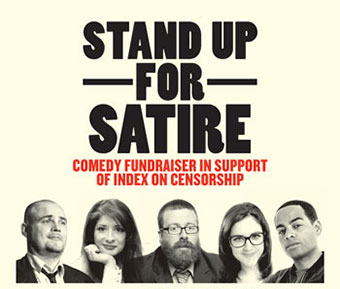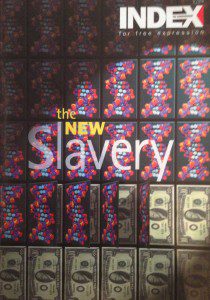29 Sep 2025 | Americas, Asia and Pacific, China, Egypt, Europe and Central Asia, In the News, India, Iran, Middle East and North Africa, News, Newsletters, Russia, United Kingdom, United States
If you want to take the temperature of a nation in terms of free speech just look at how it treats its comedians. Countries with robust human rights records can take a joke, the reverse is the case for dictatorships. Comedy “masquerades as folly, but it can take down an empire” wrote Shalom Auslander in a recent issue of our magazine to explain why joke tellers are so often targets. Which of course brings us to Donald Trump and Jimmy Kimmel. The story gripped us all and exposed both Trump’s thin-skin and the role corporations play today in censorship. Bassem Youssef, an Egyptian-American satirist who had to stop his show in Egypt following significant pressure, responded to the suspension of Kimmel with a quip on X: “My Fellow American Citizens. Welcome to my world.”
Fortunately, the USA is not el-Sisi’s Egypt – yet. Kimmel is now back on air after a public outcry and cancellations of subscriptions to Disney’s streaming services. Turns out, the dollar speaks both ways. Meanwhile, a statue of Trump holding hands with Jeffrey Epstein appeared in Washington this week. The bronze-painted installation, titled Best Friends Forever, depicted the two men smiling at each other. The statue made its point, though not for long. The team behind the statue, called The Secret Handshake, had apparently been granted a permit to have it remain there until Sunday evening. It didn’t last a day.
The UK is struggling with humour too. Last month, Banksy’s mural of a protester being beaten by a judge was wiped from the Royal Courts of Justice almost before the paint dried. Officials cited the building’s listed status, but the speed was telling. In a separate incident a protester holding a Private Eye cartoon was arrested at a Palestine solidarity march in July, satire clearly lost on the police.
It’s worse elsewhere. In Iran, Zeinab Mousavi, one of the first Iranian women to do stand-up comedy, is a frequent target of the authorities. Last month she was charged with making statements that were “contrary to public morality”. In China, a joke about the military led to a comedian being arrested, and the company behind him being fined millions. It was a similar story in India, after a popular comedian, Kunal Kamra, was accused of insulting a local politician. Kamra is just the latest comedian to be targeted, as highlighted by Index.
Reflecting on Kimmel, Russian journalist and dissident Andrei Soldatov offered a warning. Shortly after Vladimir Putin became president in 2000, armed operatives raided the offices of NTV, the network that aired Kukly, a puppet show taking aim at Putin. NTV owner Vladimir Gusinsky was jailed and Kukly disappeared shortly after. Soldatov said at the time many Russian journalists and intellectuals rationalised the attack. A few spoke out though. “You can’t make friends with a crocodile” they said. US executives would be wise to remember this.
1 Aug 2025 | Africa, Americas, DR Congo, Europe and Central Asia, Israel, Middle East and North Africa, News, Palestine, United Kingdom, United States
In the age of online information, it can feel harder than ever to stay informed. As we get bombarded with news from all angles, important stories can easily pass us by. To help you cut through the noise, every Friday Index publishes a weekly news roundup of some of the key stories covering censorship and free expression. This week, we look at the killing of a Palestinian activist, and how Jewish comedians had their shows cancelled at Edinburgh Fringe.
Death for a documentary: Palestinian who worked on “No Other Land” killed in West Bank
Awdah Hathaleen, a Palestinian activist and community leader in the West Bank who worked on Oscar-winning documentary No Other Land, was shot and killed outside a community centre on Monday 28 July.
The suspected shooter, identified as settler Yinon Levi, was sanctioned by the UK and EU last year. The incident was recorded, and was posted on X by No Other Land co-director Yuval Abraham. Following the shooting, an ambulance arrived to collect Hathaleen, and despite an autopsy being completed on Wednesday, the Israeli army is reportedly refusing to return his body to his family.
The military has set out demands to the family, including that no mourning tent be set up near Hathaleen’s home, and that he be buried in a nearby city rather than his home village; demands that his family have refused. More than 70 women in the village of Umm al-Kheir where the shooting took place have begun a hunger strike in response to the withholding of Hathaleen’s body, as well as continued arrests and detention for the citizens of the village since the incident. In contrast, Levi was released on house arrest on Tuesday.
Hathaleen had reportedly warned UK parliament about threats to his life before the incident, and he is not the first activist who worked on No Other Land to be attacked. The Palestinian co-director of the film, Hamdan Ballal, was beaten by masked settlers outside his home before he was detained by the IDF in March 2025.
Show’s over: Jewish comedians have Edinburgh Fringe shows cancelled over safety concerns
Two Jewish comedians have had their shows cancelled at the Edinburgh Fringe Festival over “safety concerns” raised by staff at the venue.
Rachel Creeger was one of the comedians to have had her show at Whistlebinkies – the venue in question – cancelled. She told Jewish News that she had previously performed there twice before, and that it was a “safe and happy space” for her. She received the call that her show was cancelled two weeks ahead of the performance date, with bar staff reportedly feeling unsafe with the extra security that was recommended for Jewish comedians.
Phillip Simon, the other comedian due to perform, also had a run of performances at Banshee Labyrinth cancelled. The venue claimed that they had made this decision after screening his social media account, picking out photos from a vigil marking 100 days since the 7 October attack, as well as messages mocking Greta Thunberg’s attempt to bring aid to Gaza via a flotilla. They stated that these posts signified views at odds with Banshee Labyrinth’s “stance against the current Israeli government’s policy and actions”. Simon rejected this claim, arguing that he had only ever supported “freeing the hostages and finding a way for peace”, and that he was “cancelled just for being Jewish”.
The bans have drawn much criticism, with shadow Scotland Secretary Andrew Bowie stating this incident “speaks very ill of the state of affairs in this country” regarding antisemitism. Festival organisers reportedly attempted to find alternate locations for the performances, but the short notice of the cancellations meant that none could be found; the performances have been removed from Fringe Festival’s website.
Taking the government to court: Palestine Action granted permission to challenge their proscription
A co-founder of Palestine Action, Huda Ammori, has won the right to challenge the proscription of the group as a terrorist organisation in court in a landmark ruling, with a hearing scheduled for November.
Palestine Action was banned under anti-terrorism laws after two members of the group broke into RAF Brize Norton airbase and defaced aircraft. Since then, more than 200 people have been arrested for expressing support for them – a charge punishable by up to 14 years in prison. In July, Laura Murton was threatened with arrest by Kent police under the Terrorism Act despite showing no direct support for Palestine Action, with police being recorded telling her that the phrase “Free Gaza”, which she had written on a sign, was “supportive of Palestine Action”.
Mr Justice Chamberlain, ruling on the case, cited incidents like Murton’s as being “liable to have a chilling effect on those wishing to express legitimate political views”. He stated it was “arguable” that the proscription of the group amounted to a “disproportionate interference” to the rights of freedom of expression and of assembly as they are described in the European Court of Human Rights (ECtHR). This sentiment echoes that of UN human rights commissioner Volker Türk, who argued that the proscription of the group was an “impermissible restriction” on freedom of expression.
No questions allowed: Three DRC journalists detained for attempting to question a minister
On 23 July, three journalists from the Democratic Republic of Congo (DRC) were allegedly beaten and detained by officials after they visited the office of the Tshopo province’s Minister of Finance Patrick Valencio to question him about his appearance in, and alleged funding of, a TV series.
The journalists – KIS24 Info’s Steve Paluku, ElectionNet’s Paul Beyokobana, and Kisangani News newspaper’s Sébastien Mulamba – were reportedly beaten with sticks by officials before being taken to a local police station, where they were forced to stay overnight. Released the next day, the three have been ordered to the prosecutor’s office to meet Valencio.
DRC has repeatedly proven to be an unsafe country for journalists; The African nation ranks 133rd out of 180 countries in Reporters Without Borders’ Press Freedom Index, with more than 50 attacks on journalists and newsrooms being reported in regions of the country mired in conflict with neighboring Rwanda.
Under watchful eyes: USA placed on civil society watchlist
The United States has been placed on a watchlist compiled by global civil society organisations highlighting “serious concerns regarding the exercise of civic freedoms” in the country, alongside nations such as El Salvador and Kenya.
The monthly watchlist, compiled by civil society watchdog CIVICUS, is intended to draw attention to countries in which civil liberties, such as freedom to protest and the free operation of non-governmental organisations (NGOs) are in steep decline. CIVICUS states that the US “appears to be sliding deeper into the quicksands of authoritarianism”.
Mandeep Tiwana, secretary general of CIVICUS, cited such incidents as the deployment of over 2000 members of the national guard to counter anti Immigrations and Customs Enforcement (ICE) protests as reasoning for the US’s place on the watchlist. Tiwana said these incidents were “incompatible with the essence of democracy” and a “preferred tactic of despots around the world”. Tiwana also denounced the targeting and arrest of journalists such as Mario Guevara, who was detained after reporting on the “No Kings” protests in June, as well as the attacks on those who “express solidarity with Palestinian rights,” such as Mahmoud Khalil.
The US is joined on the watchlist by El Salvador, who have built a strong relationship with the US since the beginning of Donald Trump’s second term as president, as well as Turkey, Serbia, Kenya, and Indonesia.
23 Jul 2015 | Magazine, mobile
Garzon is dressed as the kitchen maid of Government Palace. There is a party attended by ‘Tirifijo'[FARC commander], who is playing cards. President Andres Pastrana is talking to US ambassador Myles Frechette. He taunts Frechette with a riddle:
It is white, Colombia makes it and gringos eat it.”
Frechette answers: “It must be salt.”
Pastrana: “No, it is not salt.”
Frechette: “Ifit is not salt, then it must be the coco [nut].”
The maid says: “Yes, yes, it’s the coco, that little magic powder we
are always talking about.”
An advert for ELN guerrillas directed at the small investor. Voiceover:
Worried about your money? Relax, you no longer have to worry about money. Invest your savings in official certificates. ELNs are the only market instruments that can convert a heap of oil into a mountain of money. Remember that nefarious liquid emissions are not taxable or subject to deductions at source. There’s no time to waste, invest now in nefarious liquid emissions. Your future will be like oil: black.
 Index on Censorship has been publishing articles on satire by writers across the globe throughout its 43-year history. Ahead of our event, Stand Up for Satire, we published a series of archival posts from the magazine on satire and its connection with freedom of expression.
Index on Censorship has been publishing articles on satire by writers across the globe throughout its 43-year history. Ahead of our event, Stand Up for Satire, we published a series of archival posts from the magazine on satire and its connection with freedom of expression.
14 July: The power of satirical comedy in Zimbabwe by Samm Farai Monro | 17 July: How to Win Friends and Influence an Election by Rowan Atkinson | 21 July: Comfort Zones by Scott Capurro | 24 July: They shoot comedians by Jamie Garzon | 28 July: Comedy is everywhere by Milan Kundera | Student reading lists: Comedy and censorship

A woman looking out her window sees the Rodriguez family [drug cartel] leaving their apartment block. The family is wanted by the police. She calls the police. The captain regretfully informs her that the Rodriguez family does not exist, he has checked the phonebook and there is no Rodriguez family listed. The woman perseveres:
I’ve spent the last 25 minutes trying to hand you these bad men. Now they are leaving. They’re getting into a car with some politicians. God! These politicians are like Pontius Pilate, some denied him and others wash their hands of him. But captain, if you come quickly you’ll understand what is happening in this country. Too late, they’re gone. I’ll call you again next week.
Edited transripts of television satires by journalist and humourist Jaime Garzon (1995). At Gam on 13 August 1999, Garzon was executed on his way to the Radionet studio by two men riding on a motorcycle. Garzon, known for his intervention in the stalled peace process, had reportedly been threatened by Carlos Castano, head of the paramilitary United Self-Defence Force of Colombia (AUC), in the preceding days. According to colleagues, Garzon planned to meet Castano on 14 August 1999. The AUC denied any responsibility in the assassination. Translated by Paulo Drinot.
 This article is from the January/February 2000 issue of Index on Censorship magazine and is part of a series of articles on satire from the Index on Censorship archives. Subscribe here, or buy a single issue. Every purchase helps fund Index on Censorship’s work around the world. For reproduction rights, please contact Index on Censorship directly, via [email protected]
This article is from the January/February 2000 issue of Index on Censorship magazine and is part of a series of articles on satire from the Index on Censorship archives. Subscribe here, or buy a single issue. Every purchase helps fund Index on Censorship’s work around the world. For reproduction rights, please contact Index on Censorship directly, via [email protected]



 This article is from the January/February 2000 issue of Index on Censorship magazine and is part of a series of articles on satire from the Index on Censorship archives.
This article is from the January/February 2000 issue of Index on Censorship magazine and is part of a series of articles on satire from the Index on Censorship archives.